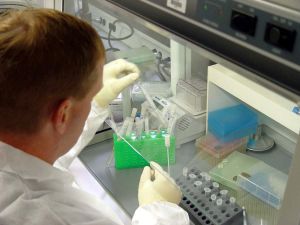A collaboration of Anacor Pharmaceuticals in Palo Alto, California with Colorado State University and University of California in Berkeley is researching new types of antibiotics to treat a broad range of infections, including those resistant to current antibiotics. The $13.5 million, 3.5 year project is funded by the Defense Threat Reduction Agency, part of the U.S. Department of Defense.
The project, according to an Anacor statement, aims to design and discover new classes of antibiotics that counteract pathogens known to be resistant to antibiotics. The project team includes Richard Slayden from Colorado State’s Center for Environmental Medicine in Fort Collins, cell biologist Jamie Cate at UC-Berkeley, and biochemist Jonas Noeske, also at UC-Berkeley.
Under the agreement, the researchers will propose new antibiotics targeting pathogens that the agency considers potential biological threats. The team is expected to employ Anacor’s technology based on boron — a naturally occurring element found in fruits, vegetables, milk, and coffee — rather than carbon.
The company says boron-based compounds have a unique geometry that makes it possible for the compounds to interact with biological targets differently than carbon-based drugs. In addition, says Anacor, boron’s reactions to biological targets can be adjusted to maximize the impact of the drugs and minimize adverse effects. New classes of compounds identified by the researchers will then be considered for development by Defense Threat Reduction Agency.
Anacor’s lead compounds are treatments for fungal and inflammatory skin disorders, but the company earlier developed a boron-based antibiotic code-named AN3365 to treat gram-negative infections, a class of infections that include many of those acquired in health care facilities and becoming increasingly resistant to antibiotics. AN3365, says Anacor, is designed for both oral and intravenous administration and covers a broad range of gram-negative infections. The company licensed AN3365 to GlaxoSmithKline that found some patients in intermediate-stage clinical trials developed a resistance to the compound, leading to GSK halting the trial and returning the rights to the drug to Anacor.
Read more:
- Genetic-Based Antibiotic Found Effective in Lab Tests
- Copper and Copper Alloys Found to Destroy Norovirus
- Top Hospital Infection Costs Estimated at $9.8B Per Year
- Challenge Seeks Point-of-Care Staph Bacteria Detector
- Gates Foundation Funds, Invests in Tropical Disease Research
* * *


 RSS - Posts
RSS - Posts
[…] Consortium Formed for Antibiotic Resistance Drug Discovery […]